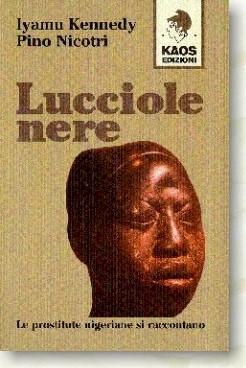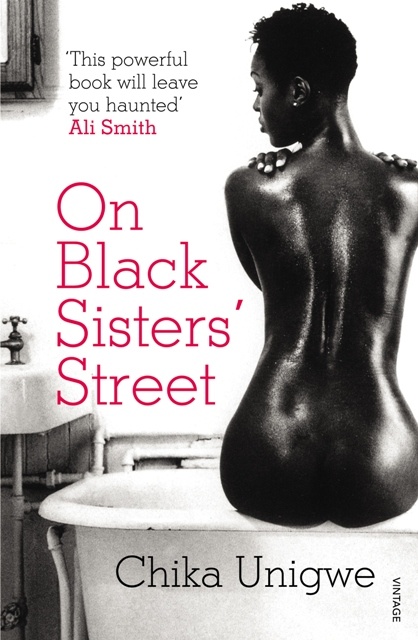 Sex trafficking campaigners often single out Nigerian women as the worst case of sex trafficking, because of debts that sound the largest and the sometime presence of so-called rituals that are supposed to have bound these migrants in a specially sinister way to their traffickers. It’s old-fashioned racist colonialism – an unwillingness to imagine even the most superficial aspects of a non-western culture, jumping to lurid conclusions instead, in which juju ceremonies are somehow not comparable to Roman Catholic ones, for example – though promises, talismen and emotion are found in both. As though one sort of prayer for help or success were inherently irrational and the other not.
Sex trafficking campaigners often single out Nigerian women as the worst case of sex trafficking, because of debts that sound the largest and the sometime presence of so-called rituals that are supposed to have bound these migrants in a specially sinister way to their traffickers. It’s old-fashioned racist colonialism – an unwillingness to imagine even the most superficial aspects of a non-western culture, jumping to lurid conclusions instead, in which juju ceremonies are somehow not comparable to Roman Catholic ones, for example – though promises, talismen and emotion are found in both. As though one sort of prayer for help or success were inherently irrational and the other not.
That’s not to say that conditions are not pretty dire for many women and men in western Africa, politically and economically – which means people can be willing to take big risks and assume onerous debts when they travel to work abroad. I learned about how some migrants think about that in Lucciole neri – Le prostitute nigeriane si raccontano (Iyamu Kennedy and Pino Nicotri, editors, 1999), one of my sources of ethnographic research with migrants who sell sex in Europe, for what eventually became Sex at the Margins. These Nigerians were working in Italy.
 On Black Sisters’ Street, by Chika Unigwe, came out in 2009, but I have only just read it (prompted by This is Africa’s mention of it along with my book recently). It’s a novel telling the stories of four women’s migrations from Nigeria to Belgium where they work in windows in the red-light district. None of them has had an easy life and none of them sees herself as a victim, despite the presence of a powerful smuggler in Lagos and a controlling madam in Antwerp. They are, the author says, willing to play the trump card that God has wedged in between their legs. Unigwe has said:
On Black Sisters’ Street, by Chika Unigwe, came out in 2009, but I have only just read it (prompted by This is Africa’s mention of it along with my book recently). It’s a novel telling the stories of four women’s migrations from Nigeria to Belgium where they work in windows in the red-light district. None of them has had an easy life and none of them sees herself as a victim, despite the presence of a powerful smuggler in Lagos and a controlling madam in Antwerp. They are, the author says, willing to play the trump card that God has wedged in between their legs. Unigwe has said:
If your parents can’t help you out and your government has failed you, these pimps and traffickers have at least given you a chance to leave and make a living. He’s your saviour. It takes someone outside the situation to see these pimps and traffickers as the bad guys.
At the end of the book we are told how three of the women fare in the future. After nine years in Antwerp, Efe became a madam herself.
It would take eighteen months to get her first of two girls whom she would indeed buy at an auction presided by a tall, good-looking Nigerian man in sunglasses and a beret. It would be in a house in Brussels, with lots to drink and soft music playing in the background. The women would enter the country with a musical band billed to perform at the Lokerenfeest. The man in the sunglasses was the manager of the band and as usual had, in addition to genuine members of the band, added the names of the women who had paid him to the list he submitted at the embassy in Abuja. The women would be called into the room one at a time for the buyers to see and admire. They would all have numbers, for names were not important. Their names would be chosen by whoever bought them. Names that would be easy for white clients to pronounce… Efe would buy numbers five and seven. Number five because she smiled easily. Number seven because she looked docile and eager to please, the sort of girl who was grateful for little. Like Madam, Efe would have some police officers on her payroll to ensure the security of her girls and of her business. She would do well in the business, buying more girls to add to her fleet. pp 278-9
Yes, this is an auction where employers bid on women who will sell sex. It is not slave-trading, however.
–Laura Agustín, the Naked Anthropologist

“Yes, this is an auction where employers bid on women who will sell sex. It is not slave-trading, however.”
The ‘Rescue Industry’ may not see it that way (they are rather literal about these things), so you would have to work hard at making the distinction. However, I think the Indian Premier League for cricket has a similar ‘bidding’ process for players, so presumably male cricketers do not become ‘slaves’ to Indian pimps as they bat, bowl or field.
the thing about a blog is that one can make arguments in small doses, get into the details slowly. also repetition helps. i have been reading about 19th-century chattel slavery and abolitionism and realising that present-day enthusiasts know very little of that history, and the diversity, and the way certain practices persist in all sorts of ways they don’t take notice of – baseball, football and US football players are traded and sold conventionally, and often against their desires. however they know this is part of the profession.
Yes and what about the National Football League’s draft process. And the National Major League Baseball draft….They hustle not yet graduated from high school teenage boys away from their families for a life on the road where they’re trafficked from town to town and state to state.
Laura, would you rec’d “Black Sisters Street” as a novel? By that I mean, engrossing as well as politically sensitive? I’m always looking for books to both help my insomnia and also rec’d to students/activists who will not read academic nonfiction!
As a novel it’s okay, not great, but sensitive, informative and worthy. As for students, I don’t know, because all four stories are quite unpleasant and untutored minds could easily just leap to the slavery-exploitation-denounce-abolish conclusion. Possibly more easily in the US where the phenomenon of migrant sex workers from western Africa is not familiar. If you have very sophisticated students who have already read other stuff on the subject then this caveat doesn’t apply!
Agustin: “baseball, football and US football players are traded and sold conventionally, and often against their desires.”
…and as I under stand it, US sports clubs don’t even have to pay when it comes to ‘draft picks’.
So, if the comparison stands, we’re left with the ‘antis’ claiming it’s ‘different’ because it’s about sex. Again.
that’s right. and other sorts of practices that get people het up if sex is involved don’t bother people when sex isn’t involved, such as student loans so large they might be called ‘debt bondage’ but aren’t.
Here’s a question, Laura. Maybe you could help with this…
Early 20th century anthropology got involved in the whole “brideprice” debate in Africa, defending the notion that this was not “buying women”. With the current moral panic, are we seeing a renewed interest among abolitionists in the idea that “brideprice” is buying women?
The way I’d put it is that nowadays a lot of practices that look like the exchange of money for women are called into question as forms of violence or slavery. Dating and marriage are excepted, but anything that seems to come from non-middle-class-white culture is suspicious.
I have dealt extensively with this issue, spending a year in Benin City, Nigeria, and six months in Turin, Italy. The research was eventually written up as a PhD in Social Anthropology (‘Ambiguous bonds: A contextual study of Nigerian sex labour in Italy,’ 2010). I agree that distinctions must be made between slavery and other forms of bondage: I’d call this one ‘pawnship’, it has precedents in the West-African region though of course there are also significant differences, as the political-economic context has changed. But I disagree with the statement that ‘It takes someone outside the situation to see these pimps and traffickers as the bad guys.’ Sometimes madams are hailed as helpers, but very often the relationships are ambiguous and very brutal, with women (or their families back in Nigeria) killed, beaten, raped into compliance…And the fact that open condemnation is not voiced may also be an indication of fear and respect for authority. When talking about the experiences of others, people are much more ready to give negative judgements…
Yes, Unigwe went a bit far with that comment, although I know what she meant and I think you do as well. It’s about being inside the situation, not looking at it from the outside. It’s cultural relativism of the sort the woman in Sussex acted outraged about the other week. I believe I understand why so many people disapprove and want to be able to make decisions about good and bad that I mostly don’t want to make.
Nice to meet you in London, by the way.